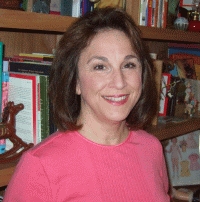by Stephanie Jacob Gordon
First thing you should know is that I never went to a summer camp as a kid. I did go at seventeen to Brandies, a kibbutz-like camp, in the wilds of Santa Susanna, CA. I did counsel at the adjacent kids camp, Alonim, two year later. I did send my kids to camp. And, my family has done a lot of camping—we still do.
Second thing you should know is I really know my way around a gold pan and a sluice box. Years ago Judy and I took a class on gold panning. We went with the teacher and our seven men classmates to pan for gold in Hungry Valley and…EUREKA! We discovered gold with our plastic pan and spoon. The seven guys with the sluice box didn’t. She who laughs last, laughs longest!
Third thing you should know is I never did any mining at any summer camp…ever.
So where did I mine and why did I do it?
The first book I wrote and sold was called WANTED: A LITTLE LOVE and it was set at a kid’s summer camp; Camp Big Thunder Of Eagles, or Camp Big Toe as my characters renamed it. This book took a lot of mining—in my brain and in my imagination.
When I was at Brandeis, the teen camp, I got a very bad cold and took Cheracol…when it still had codine in it. In no time at all, I passed out in my tent in my sleeping bag. So far, not too exciting. Until…I woke and saw the squirrel sleeping in my bag all cozy on my chest. I scream. The squirrel screamed (in squirrel of course) and headed for the hills. After a check-up from the nurse, I was declared flea and bite free. I do not know how the poor squirrel ended up.
That was an event that could have happened to any camper at any camp (well maybe not, weird things always happen to me). Into the book.
At Berkley Camp in Yosemite, while my boys went water rafting, an experience I knew I would not like to experience, my eight year old daughter and I went fishing in the Merced River. Fishing is something I am good at. We were going to catch the legendry old trout, Boris. After a few trout and a few falls in the river, I am happy to report that Boris still lived long after we went home. In to the book.
At Alonim, I was nineteen, engaged, and the counselor of twelve thirteen year old girls. It was One Flew Over The Cuckoo’s Nest, and they were driving me up the cuckoo’s tree. Don’t even ask me about the thirteen year old boy who was in love with me.
One day I was assigned life guard training. Ummmm…I swim with my face out of the water. How was I going to learn how to save someone when I was terrified of getting my face wet? The camper I was supposed to save jumped in the water and swam to the center of the pool. I walked down the stairs…I do not jump into water. I dog-paddled to the camper who was thrashing in the water like a very realistic drowning person, and tried to put my arm around his neck to dog- paddle him to the side of the pool where two other counselors could pull him out. Except the kid never stopped fighting me and he pushed me under and I panicked. Now I am the one who is really drowning, splashing around like a confused salmon who doesn’t know which way is up stream, and the two counselors (who already have their life guard certifications) have to jump in and save me. Guess who was the arts and crafts counselor that summer? Guess who never went into the pool when kids were in it. Into the book.
I like to write humor. Not everything that has happened to me is funny. At least it isn’t while it is happening. For me time and perspective are everything when it comes to funny. Sooner or later (usually later) I find the humor in everything. If I didn’t, there would no way I could write humor or stay calm and carry on. LOL
Where have you been? What have you done, seen, imagined doing? Who do you know? Mine other people’s mind.
For an historical, JACQULINE, that Judy and I wrote, I knew a waitress who, back in the 30’s, spilled soup on the big boss and had to hide in the broom closet whenever he came in the restaurant, because he fired her. The nice manager let her stay. It was my mom. Into the book.
In the same story, Judy’s aunt or a friend of her aunt or a friend of friend of her aunt told us about messing up the entire assembly line in box factory and was fired before she was even hired. Into the book.
Is your son the kid who came home from school one cold winter day, and when you took off his Jacket his shirt was missing. Why aren’t you wearing a shirt you asked him? I didn’t wear one to school because it was too hot when I ate breakfast. Into the book.
Good things and bad things, funny things and serious things, happy things and sad things, real things and made-up things, all the little and all the big things go… INTO THE BOOK.
 This summer has been one in which “life” takes over from the usual routine of writing. Some of the events have been tough: Laurie’s dad passed away; Judy’s dad passed away. Others involved relocation: Cheryl moved. Steph’s house is for sale. And then there are family stages: Dawne has been hither and yon organizing kids. So rather than the usual individual maven post, this month we offer an olio (it’s a great crossword puzzle word) of thoughts, favorite quotes, and writing advice.
This summer has been one in which “life” takes over from the usual routine of writing. Some of the events have been tough: Laurie’s dad passed away; Judy’s dad passed away. Others involved relocation: Cheryl moved. Steph’s house is for sale. And then there are family stages: Dawne has been hither and yon organizing kids. So rather than the usual individual maven post, this month we offer an olio (it’s a great crossword puzzle word) of thoughts, favorite quotes, and writing advice.





